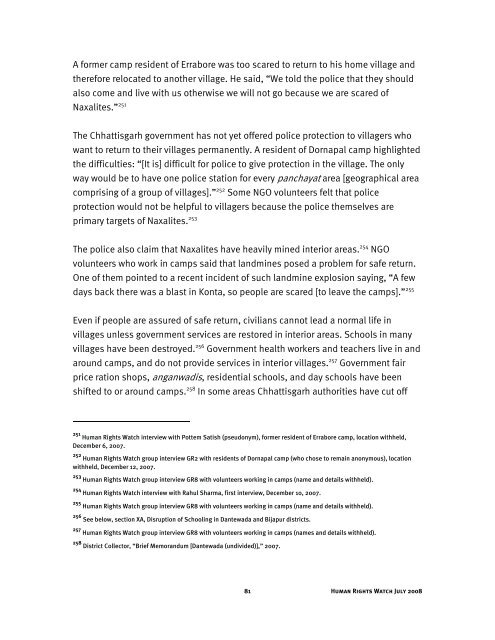âBeing Neutral is Our Biggest Crimeâ - Global Coalition to Protect ...
âBeing Neutral is Our Biggest Crimeâ - Global Coalition to Protect ...
âBeing Neutral is Our Biggest Crimeâ - Global Coalition to Protect ...
You also want an ePaper? Increase the reach of your titles
YUMPU automatically turns print PDFs into web optimized ePapers that Google loves.
A former camp resident of Errabore was <strong>to</strong>o scared <strong>to</strong> return <strong>to</strong> h<strong>is</strong> home village and<br />
therefore relocated <strong>to</strong> another village. He said, “We <strong>to</strong>ld the police that they should<br />
also come and live with us otherw<strong>is</strong>e we will not go because we are scared of<br />
Naxalites.” 251<br />
The Chhatt<strong>is</strong>garh government has not yet offered police protection <strong>to</strong> villagers who<br />
want <strong>to</strong> return <strong>to</strong> their villages permanently. A resident of Dornapal camp highlighted<br />
the difficulties: “[It <strong>is</strong>] difficult for police <strong>to</strong> give protection in the village. The only<br />
way would be <strong>to</strong> have one police station for every panchayat area [geographical area<br />
compr<strong>is</strong>ing of a group of villages].” 252 Some NGO volunteers felt that police<br />
protection would not be helpful <strong>to</strong> villagers because the police themselves are<br />
primary targets of Naxalites. 253<br />
The police also claim that Naxalites have heavily mined interior areas. 254 NGO<br />
volunteers who work in camps said that landmines posed a problem for safe return.<br />
One of them pointed <strong>to</strong> a recent incident of such landmine explosion saying, “A few<br />
days back there was a blast in Konta, so people are scared [<strong>to</strong> leave the camps].” 255<br />
Even if people are assured of safe return, civilians cannot lead a normal life in<br />
villages unless government services are res<strong>to</strong>red in interior areas. Schools in many<br />
villages have been destroyed. 256 Government health workers and teachers live in and<br />
around camps, and do not provide services in interior villages. 257 Government fair<br />
price ration shops, anganwad<strong>is</strong>, residential schools, and day schools have been<br />
shifted <strong>to</strong> or around camps. 258 In some areas Chhatt<strong>is</strong>garh authorities have cut off<br />
251 Human Rights Watch interview with Pottem Sat<strong>is</strong>h (pseudonym), former resident of Errabore camp, location withheld,<br />
December 6, 2007.<br />
252 Human Rights Watch group interview GR2 with residents of Dornapal camp (who chose <strong>to</strong> remain anonymous), location<br />
withheld, December 12, 2007.<br />
253 Human Rights Watch group interview GR8 with volunteers working in camps (name and details withheld).<br />
254 Human Rights Watch interview with Rahul Sharma, first interview, December 10, 2007.<br />
255 Human Rights Watch group interview GR8 with volunteers working in camps (name and details withheld).<br />
256 See below, section XA, D<strong>is</strong>ruption of Schooling in Dantewada and Bijapur d<strong>is</strong>tricts.<br />
257 Human Rights Watch group interview GR8 with volunteers working in camps (names and details withheld).<br />
258 D<strong>is</strong>trict Collec<strong>to</strong>r, “Brief Memorandum [Dantewada (undivided)],” 2007.<br />
81<br />
Human Rights Watch July 2008
















